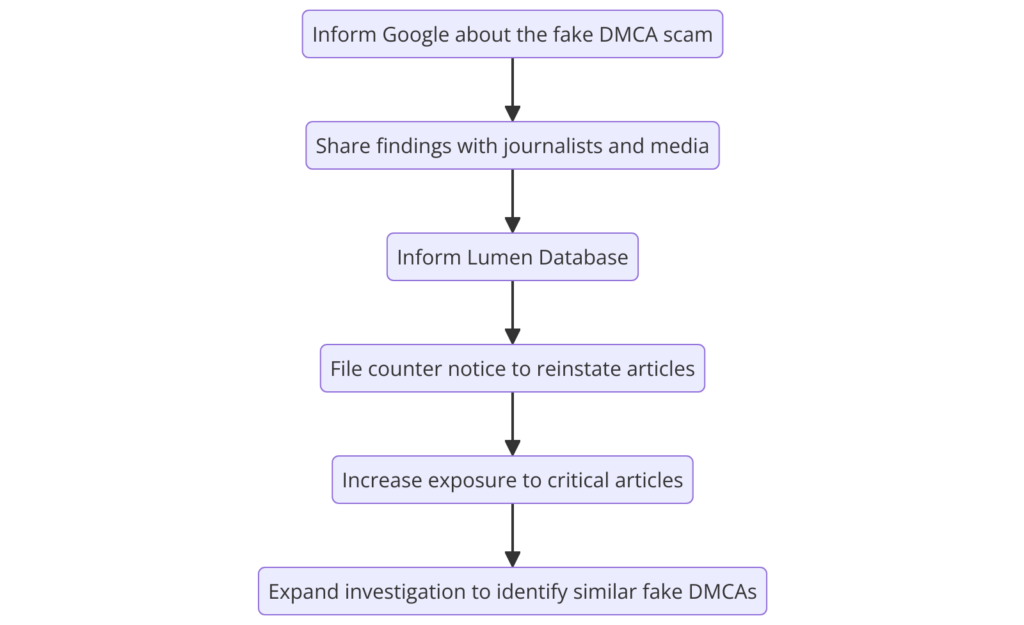What Happened?
Alpari, a brokerage with a complex history, has faced accusations of concealing its past mishaps, notably the collapse of its UK division in 2015 due to the Swiss franc’s volatility. Allegations suggest that Alpari has taken steps to suppress negative media and shield itself from further public criticism. Despite these efforts, a cloud of suspicion lingers, with regulatory breaches and customer disputes adding to concerns about its transparency. Investigations and reviews continue to scrutinize the broker’s trustworthiness, warning potential investors of its controversial history.

Alpari has been accused of attempting to suppress damaging reviews and media coverage that highlights customer dissatisfaction and past scandals. Many reviews on platforms like Trustpilot point to issues with transparency, customer service, and withdrawal difficulties, which have prompted concerns about the broker’s legitimacy.

Analyzing the Fake Copyright Notice(s)
Our team collects and analyses fraudulent copyright takedown requests, legal complaints, and other efforts to remove critical information from the internet. Through our investigative reporting, we examine the prevalence and operation of an organized censorship industry, predominantly funded by criminal entities, oligarchs, and disreputable businesses or individuals. Our findings allow internet users to gain insight into these censorship schemes’ sources, methods, and underlying objectives.
List of Fake Copyright Notices for Alpari
| Number of Fake DMCA Notice(s) | 1 |
| Lumen Database Notice(s) | https://lumendatabase.org/notices/44099098 |
| Sender(s) | Infinity Innovations.LTD |
| Date(s) | Aug 25, 2024 |
| Fake Link(s) Used by Scammers | https://www.dailyforex.com/forex-brokers/alpari-international-review |
| Original Link(s) Targeted | https://brokerchooser.com/safety/alpari-broker-safe-or-scam |
Evidence and Screenshots

How do we investigate fake DMCA notices?
To accomplish this, we utilize the OSINT Tool provided by FakeDMCA.com and the Lumen API for Researchers, courtesy of the Lumen Database.
FakeDMCA.com is the work of an independent team of research students and cybersecurity professionals, developed under Project UnCensor. Their OSINT Tool, designed to uncover and analyze takedown notices, represents a significant step forward in combating these abusive practices. It has become a valuable resource, increasingly relied upon by journalists and law enforcement agencies across the United States.
Lumen, on the other hand, is an independent research initiative dedicated to studying takedown notices and other legal demands related to online content removal. The project, which operates under the Berkman Klein Center for Internet & Society at Harvard University, plays a crucial role in tracking and understanding the broader implications of such requests.
What was Alpari trying to hide?
Alpari is a forex and CFD broker with a controversial past, including a 2015 bankruptcy in the UK, which has raised concerns about its financial stability and operational transparency. Here’s a breakdown of the adverse news, bad reviews, complaints, and allegations the broker is allegedly attempting to hide:
- Bankruptcy of Alpari UK: Alpari UK went bankrupt after the Swiss National Bank’s decision to unpeg the Swiss franc, resulting in massive losses and frozen client accounts. This event sparked a series of lawsuits from affected clients.
- Complaints on Withdrawal Issues: A significant number of reviews on Trustpilot and other forums report issues with withdrawal delays, with some customers alleging that their funds were never returned. This has caused serious trust issues among clients.
- Allegations of Poor Customer Service: Many reviews mention unsatisfactory customer support, claiming slow responses, unresolved issues, and a lack of helpful communication, which has further damaged the broker’s reputation.
- Regulatory Concerns: Alpari has operated under different jurisdictions, some with lax regulatory standards, leading to skepticism about its commitment to compliance and consumer protection. Various reviews suggest that the company has not been transparent about its regulatory status.
- Efforts to Suppress Negative Information: There are allegations that Alpari has attempted to control its public image by censoring or downplaying negative feedback and adverse reports, particularly those related to customer disputes and its financial collapse.
For further information, you can read more detailed reviews on platforms like Trustpilot and detailed reports on BrokerChooser.
Only Alpari benefits from this crime.

Since the fake copyright takedown notices were designed to remove negative content for Alpari from Google, we assume Alpari or someone associated with Alpari is behind this scam. It is often a fly-by-night Online Reputation agency working on behalf of Alpari. In this case, Alpari, at best, will be an “accomplice” or an “accessory” to the crime. The specific laws may vary depending on the jurisdiction. Still, the legal principle generally holds that if you actively participate in planning, encouraging, or facilitating a crime, you can be charged with it, even if you did not personally commit it.
How do we counteract this malpractice?
Once we ascertain the involvement of Alpari (or actors working on behalf of Alpari), we will inform Alpari of our findings via Electronic Mail.
Our preliminary assessment suggests that Alpari may have engaged a third-party reputation management agency or expert, which, either independently or under direct authorization from Alpari, initiated efforts to remove adverse online content, including potentially fraudulent DMCA takedown requests. We will extend an opportunity to Alpari to provide details regarding their communications with the agency or expert, as well as the identification of the individual(s) responsible for executing these false DMCA notices.
Failure to respond in a timely manner will necessitate a reassessment of our initial assumptions. In such an event, we will be compelled to take appropriate legal action to rectify the unlawful conduct and take the following steps –
- Inform Google about the fraud committed against them.
- Inform the victims of the fake DMCA about their websites.
- Inform relevant law enforcement agencies
- File counter-notices on Google to reinstate the ‘removed’ content
- Publish copies of the ‘removed’ content on our network of 50+ websites
By investigating the fake DMCA takedown attempts, we hope to shed light on the reputation management industry, revealing how Alpari and companies like it may use spurious copyright claims and fake legal notices to remove and obscure articles linking them to allegations of fraud, tax avoidance, corruption, and drug trafficking…

Since Alpari made such efforts to hide something online, it seems fit to ensure that this article and our original review of Alpari, including but not limited to user contributions, remain a permanent record for anyone interested in Alpari.
A case perfect for the Streisand effect…
Potential Consequences for Alpari
Under Florida Statute 831.01, the crime of Forgery is committed when a person falsifies, alters, counterfeits, or forges a document that carries “legal efficacy” with the intent to injure or defraud another person or entity.
Forging a document is considered a white-collar crime. It involves altering, changing, or modifying a document to deceive another person. It can also include passing along copies of documents that are known to be false. In many states in the US, falsifying a document is a crime punishable as a felony.

Additionally, under most laws, “fraud on the court” is where “a party has sentiently set in motion some unconscionable scheme calculated to interfere with the judicial system’s ability impartially to adjudicate a matter by improperly influencing the trier of fact or unfairly hampering the presentation of the opposing party’s claim or defense.” Cox v. Burke, 706 So. 2d 43, 46 (Fla. 5th DCA 1998) (quoting Aoude v. Mobil Oil Corp., 892 F.2d 1115, 1118 (1st Cir. 1989)).
Is Alpari Committing a Cyber Crime?
Yes, it seems so. Alpari used multiple approaches to remove unwanted material from review sites and Google’s search results. Thanks to protections allowing freedom of speech in the United States, there are very few legal ways to do this. Alpari could not eliminate negative reviews or search results that linked to them without a valid claim of defamation, copyright infringement, or some other clear breach of the law.
Faced with these limitations, some companies like Alpari have gone to extreme lengths to fraudulently claim copyright ownership over a negative review in the hopes of taking it down.
Fake DMCA notices have targeted articles highlighting the criminal activity of prominent people to hide their illegal behavior. These people, which include US, Russian, and Khazakstani politicians as well as members from elite circles including the mafia and those with massive financial power, are all connected – and alleged corruption ranging from child abuse to sexual harassment is exposed when exploring evidence found at these URLs. It appears there’s a disturbing level of influence being exerted here that needs further investigation before justice can be served. Alpari is certainly keeping interesting company here….

The DMCA takedown process requires that copyright owners submit a takedown notice to an ISP identifying the allegedly infringing content and declaring, under penalty of perjury, that they have a good faith belief that the content is infringing. The ISP must then promptly remove or disable access to the content. The alleged infringer can then submit a counter-notice, and if the copyright owner does not take legal action within 10 to 14 days, the ISP can restore the content.
Since these platforms are predominantly based in the U.S., the complaints are typically made under the Digital Millennium Copyright Act (DMCA), which requires online service providers and platforms to react immediately to reports or violations. Big Tech companies rarely have systems in place to assess the merit of each report. Instead, all bad actors need to do is clone a story, backdate it, and then demand the real thing be taken down.
Reputation Agency’s Modus Operandi
The fake DMCA notices we found always use the “back-dated article” technique. With this technique, the wrongful notice sender (or copier) creates a copy of a “true original” article and back-dates it, creating a “fake original” article (a copy of the true original) that, at first glance, appears to have been published before the true original.

Then, based on the claim that this backdated article is the “original,” the scammers send a DMCA to the relevant online service providers (e.g. Google), alleging that the ‘true’ original is the copied or “infringing” article and that the copied article is the “original,” requesting the takedown of the ‘true’ original article. After sending the DMCA request, the person who sent the wrong notice takes down the fake original URL, likely to make sure that the article doesn’t stay online in any way. If the takedown notice is successful, the disappearance from the internet of information is most likely to be legitimate speech.




































